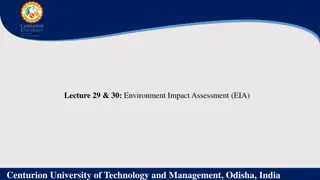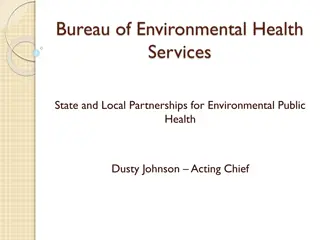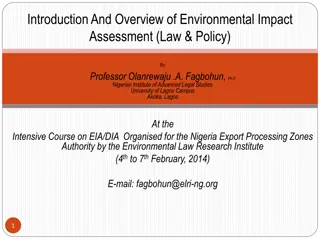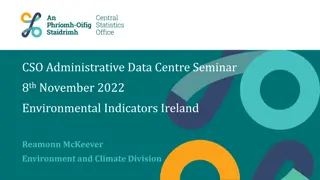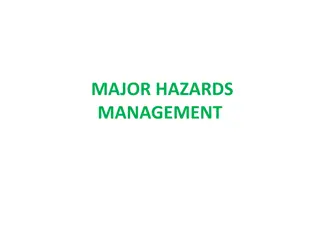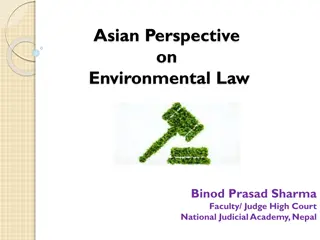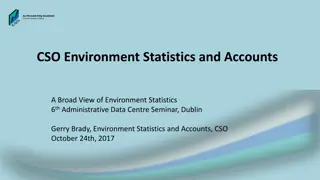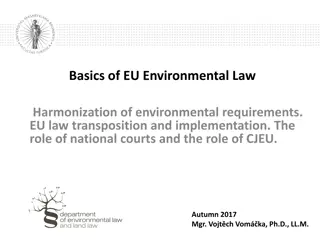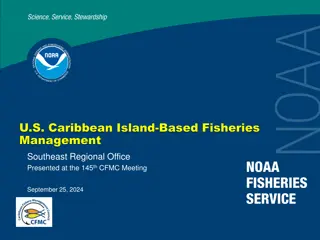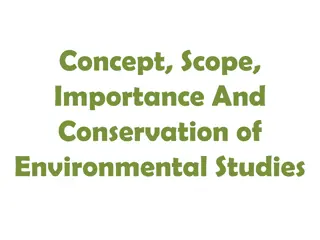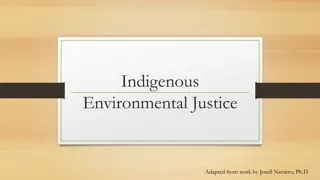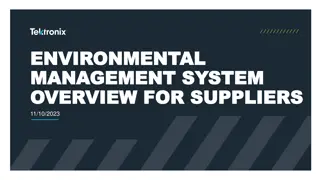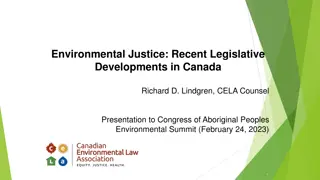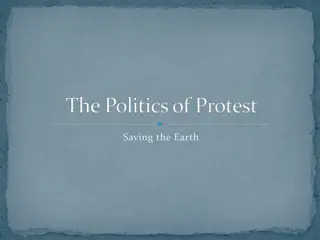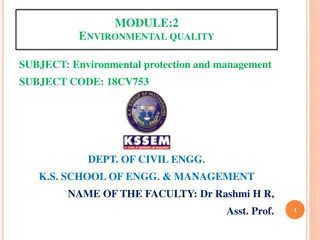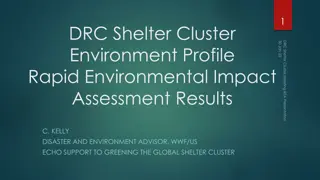Concepts & Principles of Environmental Management
Explore the foundations of environmental management including sustainable development principles, stakeholder concepts, global environmental issues, policies, legal aspects, ISO 14000 standards, ethics, waste management, and more. Dive into key topics such as climate change, pollution, environmental governance, and waste handling methods.
Download Presentation

Please find below an Image/Link to download the presentation.
The content on the website is provided AS IS for your information and personal use only. It may not be sold, licensed, or shared on other websites without obtaining consent from the author.If you encounter any issues during the download, it is possible that the publisher has removed the file from their server.
You are allowed to download the files provided on this website for personal or commercial use, subject to the condition that they are used lawfully. All files are the property of their respective owners.
The content on the website is provided AS IS for your information and personal use only. It may not be sold, licensed, or shared on other websites without obtaining consent from the author.
E N D
Presentation Transcript
ENVIRONMENTAL MANAGEMENT
Paper: 106 (ENVIRONMENTAL MANAGEMENT) Unit: I Concept and principles of environmental Management. Unit: II - Polices and Legal Aspect of Environmental Management Unit: III - ISO 14000 and Environmental Management System Standard Unit: IV - Environmental Ethics and Medical Ethics Unit: V Waste Management
Unit: I Concept and principles of environmental Management 1. Introduction: 2. (MDG) Millennium Development Goal, 3. Principles of Sustainable development, 4. Stock holder concept; 5. Environmental problems: 6. The concept of Environmental management, 7. Environmental issues such as Global warming, Climate Change, Ozone Layer depletion, Acid rain and Pollution. 8. Inter relation between Environmental crisis with poverty and disease, carbon foot print.
Unit: II Polices and Legal Aspect of Environmental Management: 1. Stockholm Conference, 2. The Earth Summit Agreement, 3. United Nations Framework Convention on climate change, 4. Kyoto Protocol, 5. Montreal Protocol, 6. Environmental Governance in India since 1972, 7. Environmental Protection and 8. Public Interest Litigation,People participation, 9. Environmental Law The Environment Protection act, 10. The Air Prevention & Control of pollution Act, 11. Forest Conservation Act. Fundamental Rights,
Unit: III ISO 14000 and Environmental Management System Standard 1. Introduction, 2. Need for the new Standards, 3. To Whom does standards Apply? 4. Whose does the Standard Apply? 5. What does the Standard ISO 14000 Series 6. General description: ISO 14001, 7. Benefits of ISO 140001, 8. Steps in ISO 14000 Certification process, 9. ISO Definition of Terms. Cover?
Unit: IV Environmental Ethics and Medical Ethics 1. Introduction. 2. Development of Environment Ethics. 3. Concept and Ethical theories. 4. Consequential. 5. Deontological. 6. Ethical Dilemma. 7. Environment and Technology Challenge of a world Environment Ethics.
Unit: V Waste Management 1. Concept. 2. Education 3. Introduction. 4. Disposal methods. 5. Avoidance and reduction method. 6. Waste handling and Transport. 7. Waste types. 8. Hazardous waste management, Bio-medical waste management . 9. Radioactive waste and Toxic waste management. and awareness.
First Of All How do we define - ENVIRONMENTAL MANAGEMENT ?
Environmental Management can be defined as The Management Of The Interaction And Impact Of Human Activities On The Natural Environment A System That Incorporates Processes For Summarizing, Monitoring, Reporting, Developing And Executing The Environmental Policies In Business, Environmental Management Is Defined As A Corporate Strategy That Monitors, Develops And Implements Environmental Policies Of An Organization
Environmental management tries to identify the factors that have a stake in the conflicts that may rise between meeting the needs but protecting the environment. It is a systematic approach that is gaining due prominence as consumers are looking for products and services that are eco-friendly and eco-aware. The aim of encouraging an environmental management system is to ensure the healthy state of our planet for future generations. It also works towards preserving all forms of life.
WHAT WAS THE NEED OF ENVIRONMENTAL MANAGEMENT? The ecological balance of our planet has been disturbed through a technological revolution, heavy industrialization, growth in transportation, unplanned urbanization and of course exploitation of resources. Ecosystem stability is in danger as the relationship between human beings and the environment has deteriorated. The relationship can once again become harmonious if people start encouraging activities like conservation, regeneration, and protection of nature Environmental management is concerned with marine, land and atmospheric conditions and works towards issues like deforestation and global warming. It looks at the carbonfootprint and tries to find ways to reduce the irreversible damage people are leaving behind. Environmental management is described as a process to minimize waste and maximize compliance. It is created to address the environmental issues that have a direct and indirect impact on the globe and is affecting it adversely. It deals in finding appropriate solution s to environmental crises and preventing ecological disasters. Environmental management also investigates potential sources of renewable energy so that fossil fuel does not become depleted.
OBJECTIVES OF ENVIRONMENTAL MANAGEMENT 1. Identifying environmental issues 2. Finding solutions for environmental issues 3. Establishing limits to avoid overuse 4. Help to renew natural resources 5. Minimize the use of natural resources 6. Developing monitoring systems and research institutions 7. Regeneration of degraded environment 8. Review the environmental goals of an organization 9. Setting environmental targets to minimize the environmental impact of an organization 10. Control environmental pollution
OBJECTIVES OF ENVIRONMENTAL MANAGEMENT 11. Ensuring environmental awareness program is being followed by every employee 12. Review existing technologies and try to make then eco-friendly 13. Make maximum utilization of natural resources 14. Assess the impacts of potential activities on the environment 15. Encourage resource conservation programs 16. Develop strategies for improving the quality of life 17. Implement ways for environmental protection 18. Minimize the impact of natural disasters 19. Identify, develop and implement policies related to sustainable development
So these were the objectives related to environment management, but apart from the environment as a whole there were lots and lots of issues across the globe that were supposed to be addressed with a sense of urgency and for doing so
- A TOTAL OF 189 NATIONS SIGNED THE HISTORIC MILLENNIUM DECLARATION AT THE UNITED NATIONS MILLENNIUM SUMMIT IN 2000 TO ASCERTIAN 8 GOALS WITH MEASURABLE TARGETS AND CLEAR DEADLINES FOR IMPROVING THE LIFE OF WORLDS POOREST PEOPLE .. THESE 8 GOALS ARE KNOWN AS MILLENIUM DEVELOPMENT GOALS (MDG)


